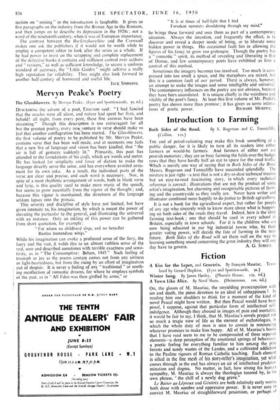Mervyn Peake's* Poetry
The Glassblowers. By Mervyn Peake. (Eyre" and Spottiswoode. 7s. 6d.)
DESCRIBING the advent of -a poet, Emerson said: " I had fancied that the oracles were all silent, and nature had spent her fires, and behold! all night, from every pore, these fine auroras have been streaming." Though this description is too extravagant for all but the greatest poetry, every newyenture in verse should make us feel that another conflagration has been started. The Glassblowers, the first volume of poetry to be published by Mr. Mervyn Peake, contains verse that has been well made, and at moments one feels that a new fire of language and vision has been kindled, that " the air is full of gestures suddenly lit." Primarily, this poet has attended to the foundations of his craft, which are words and metre. He has looked for simplicity and force of diction to make the language directly serve the sense, and has everywhere avoided orna- ment for its own sake. As a result, the individual pails of the verse are clear and precise, and each word is necessary. Nor, in spite of a most rhythmic arrangement of words, both in blank verse and lyric, is this quality used to make mere music of the speech, but seems to grow essentially from the vigour of the thought ; and, because this vigour is maintained, the directness of the language seldom lapses into the prosaic.
This severity and discipline of style have not limited, but have given intensity to, his imagination, by which is meant the power of elevating the particular to the general, and illustrating the universal with an instance. Only an inkling of this power can be gathered from short quotation, for example:
" For whom no childhood sings, and no hereafter
Rustles tremendous wings."
While his imagination can evoke a profound sense of the fiery, the faery and the vast, it welds this to an almost ruthless sense of the real, seen and described sometimes with terrible exactness and sensi- tivity, as in " The Consumptive: _ Belsen, 1945." Such feeling of triumph or joy as the poems contain comes not from any airiness or light-heartedness, but from the rising by an effort of imagination out of despair. It is never a feeling of any " traditional " or sooth- ing recollection of romantic dreams, for where he employs symbols of the past, as in " All Eden was then girdled by arms," or "It is at times of half-light that I find
Forsaken monster; shouldering through my mind,"
he brings these forward and uses them as part of a contemporary situation. Always the intention, and frequently the effect, is to discover and reveal a deeper mode of being, or to liberate some hidden power in things. His occasional fault lies in allowing the figures of his fancy to grow too grotesque. Though the poetry has a " romantic " spirit, its method of revealing and liberating is that of Donne, and few contemporary poets have exhibited as firm a control of this method.
Sometimes the imagery becomes too involved. Too much is com- pressed into too small a space, and the metaphors are mixed, but this is a common fault of our period. There is always, however, an attempt to make the images and sense intelligible and universal. The contemporary influences on the poetry are not obvious, because they have been assimilated. It is unique chiefly in the weirdness and vitality of the poet's fancy. At least this first volume of Mr. Peake's poetry has shown more than promise ; it has given us some intima-




































 Previous page
Previous page